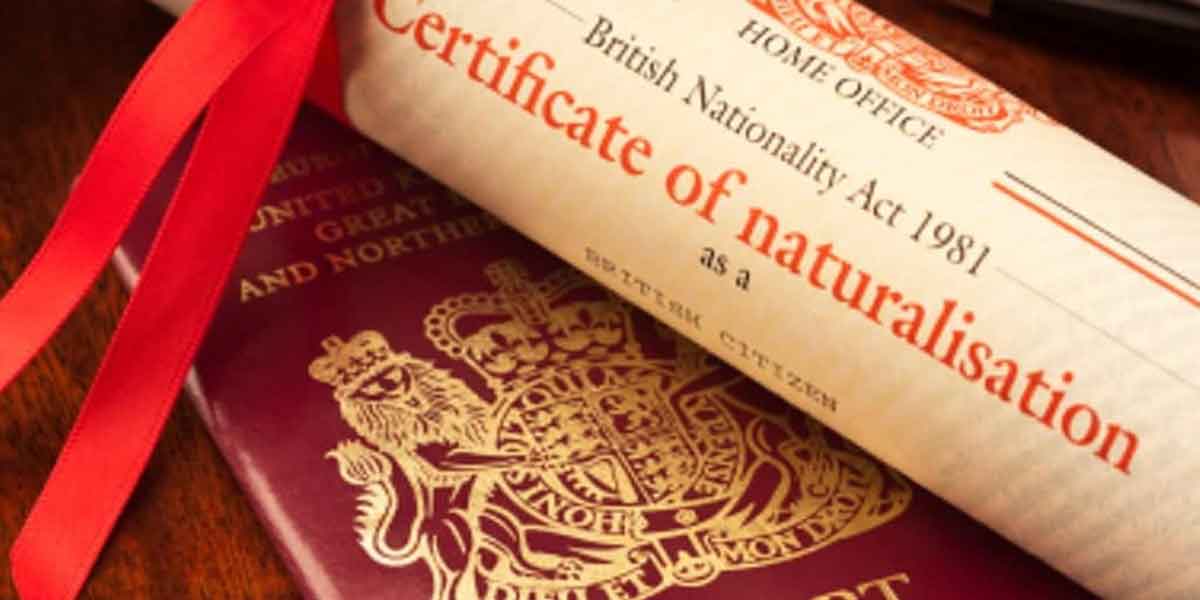

Naturalisation as British citizen Guide
Table of content
- Overview
- Requirements for naturalisation
- Naturalisation based on residence
- The residence requirements
- Naturalisation based on marriage
- Breach of immigration law
- Immigration time restrictions
- Absences from the UK
- Absences during the last 12 months
- Knowledge of English and the life in the UK
- Good character
- Criminality
- How criminal conviction may affect your application:
- Deprivation of citizenship
- Endorsement by two referees
- Application process and cost
- Supporting documents
- Citizenship Ceremonies
- Right of appeal
Overview
There are different ways to become a British citizen, the most common is by naturalisation. Naturalisation is not an entitlement; it is a matter of law as set out in the British Nationality Act 1981. A decision to grant you citizenship can only be made if you can demonstrate that you satisfy certain legal requirements and the Home Secretary thinks fit to naturalise you.
In order to be naturalised as a British citizen, you will need to meet certain statutory criteria with regard to your immigration status, length of residence in the UK, future intentions, knowledge of the English language and life in the UK, and good character.
Requirements for naturalisation
The requirements for naturalisation as a British citizen differ depending on whether it is based on your residence in the UK or your marriage or civil partnership with a British citizen.
Naturalisation based on residence
If you are not married or in civil partnership with a British citizen (or do not wish to rely on your relation with a British citizen) the Home Office must be satisfied that you meet the requirements of (Section 6(1) of the British Nationality Act 1981) including that you:
- are aged 18 or over when you apply,
- are of sound mind, so that you understand the step you are taking,
- Intend to continue to live in the UK,
- can communicate in English to an acceptable level,
- have sufficient knowledge about life in the UK,
- are of good character and
- have lived in the UK for a minimum of 5 years before you apply.
The residence requirements:
In addition, you will have to meet the following residence requirements:
- You must have been physically present in the UK on the day 5 years before the application is received by the Home Office.
- You must not have had more than 450 days outside the UK in the 5-year period before making the application.
- You must not have had more than 90 days outside the UK in the 12-month period before making the application.
- You must be free from immigration time restrictions on the date of application and have been free from immigration time restrictions for the 12-month period before making the application.
- You must not have been in breach of the immigration laws in the 5-year period before making the application.
Some discretion may be exercised over excess absences, immigration breaches, and immigration time restrictions in the last 12 months (as long as you are free from immigration time restrictions on the date of application) if there are special circumstances. If you do not meet these residence requirements but believe that there are special circumstances in your case, you should explain them when you apply.
Naturalisation based on marriage
The legal requirements are slightly different if, at the time of the application, you are married to or are in civil partnership with a British citizen, you must meet the requirements of (section 6(2) of the British Nationality Act 1981).
The specific requirements are that you are married to or are the civil partner of a British citizen on the date of application and have lived in the UK for a minimum of 3 years before you apply.
You must also satisfy the following residence requirements:
- You must have been physically present in the UK on the day 3 years before the application is received by the Home Office.
- You must not have had more than 270 days outside the UK in the 3-year period before making the application.
- You must not have had more than 90 days outside the UK in the 12-month period before making the application.
- You must be free from immigration time restrictions on the date of application
- You must not have been in breach of the immigration laws in the 3-year period before making the application.
Breach of immigration law
To meet the residence requirements, you should not have been in breach of immigration law during the residential qualifying period. You should have been in the UK legally. This means you must have had the necessary permission under the immigration laws and complied with any requirements to be in the UK. You may be refused if you have been in breach of immigration laws during the residential qualifying period. This is especially relevant if you came to the UK as an asylum seeker and your application for refugee status and any appeals were refused during this period.
Just because you were given indefinite leave to remain does not mean that the Home Office will automatically disregard the time you were in breach of immigration laws during the residential qualifying period. Any immigration offences will also be considered as part of the good character requirement. This includes immigration breaches in the 10-year period before you apply for naturalisation.
Types of UK Visas
Get in touch with our expert immigration lawyers to learn how to apply for your visa.
Immigration time restrictions
If you are married to or the civil partner of a British citizen, you will need to be free from immigration time restrictions on the date you make your application. If you are not married to or the civil partner of a British citizen, you should have been free from immigration time restrictions during the last 12 months of the 5-year qualifying period. This means that you may need to wait until you have been in the UK for 6 years before you can apply.
You can use one of the following to show you are free from immigration time restrictions on the date of application:
- an EUSS record showing you have been granted EUSS ILR (settled status)
- a passport showing permission to remain permanently in the UK
- the Home Office letter showing permission to remain permanently in the UK
- a biometric residence permit (BRP) showing ILR, ILE or no time limits
- a certificate of entitlement to the right of abode
Absences from the UK
During the application process you will be required to provide details of the periods you have been away from the UK during the last 5/3 years ignoring the day you left and the day you arrived back in the UK.
To satisfy the residence requirement you should not have been absent for more than 90 days in the last 12 months. If you are married to or in a civil partnership with a British citizen, the total number of days absence for the whole 3-year period should not exceed 270. Otherwise, you should not have been outside the UK for more than 450 days in the 5-year qualifying period.
There is discretion to disregard absences in excess of the limits as follows:
- Total number of absences normally disregarded: 480 days or 300 days for 6(2) applications (480/300).
- Absences normally disregarded only if you meet all other requirements and you have established your home, family and a substantial part of your estate in the UK: 900/540 days. If your absences are up to 730/450 days, the Home Office would expect you to have been resident in the UK for the last 7/4 years. For absences exceeding 730/450 days the Home Office would expect you to have been resident in the UK for the last 8/5 years unless the absences were a result of one of the acceptable reasons as clarified further below.
- For absences exceeding 730 days (or 450 days for 6(2) applications) the Home Office would expect you to have been resident in the UK for the last 8 years (5 years for 6(2) applications)
- unless the absences were a result of either:
- A posting abroad in Crown or designated service. For example, as a member of HM Forces, or as the husband, wife or civil partner of a British citizen serving abroad in Crown or designated service
- An unavoidable consequence of the nature of your work. For example, if you are a merchant seaman or someone working for a UK based business which requires frequent travel abroad
- Exceptional or compelling reasons of an occupational or compassionate nature such as having a firm job offer for which British citizenship is a genuine requirement.
Only very rarely the Home Office would disregard absences in excess of 900 days (540 days for section 6(2) applications). If your absences are more than this limit your application is likely to fail and your fee will not be fully refunded.
Absences during the last 12 months
Absences from the UK during the last 12 months of your qualifying period will be considered in the following way:
- Normal permitted absences in final 12 months of your qualifying period: 90 days
- Total number of absences normally disregarded: 100 days
- Total number of absences normally disregarded only if all other requirements are met and you have demonstrated links with the UK through presence of family, and established home and a substantial part of your estate: 101 – 179 days
- Total number of absences that may be disregarded if you do not meet all the other requirements providing the following criteria are met: you have demonstrated links with the UK through presence of family, and established home and a substantial part of your estate and the absence is justified by Crown service or by compelling occupational or compassionate reasons: 101 – 179 days
It will only be in the most exceptional circumstances would total absences exceeding 180 days in the final 12 months of the qualifying period be disregarded if all other requirements were not met.
Knowledge of English and the life in the UK
In addition to a pass certificate of the Life in the UK test, you will need to prove your knowledge of the English language if you’re 18 or over and applying for citizenship. You can prove it by having either an English qualification at B1 level or a degree taught or researched in English.
You do not need to prove your knowledge of English in certain circumstances including when you are:
- aged 65 or over
- unable to, because of a long-term physical or mental condition: you must provide a completed exemption form from a doctor confirming your physical or mental condition.
- a citizen of listed majority English speaking country.
Good character
The British Nationality Act 1981 requires any person who wishes to naturalise as a British Citizen to be of ‘good character’. ‘Good character’ is not defined in the Act, but Home Office nationality policy guidance explains how the requirement will be assessed. This contains a non-exhaustive list of conduct that will mean that an applicant is not of ‘good character’ including criminality, terrorism, financial soundness, notoriety, deception and dishonesty and immigration-related matters.
It is important that the good character requirement is considered carefully in any application for British Citizenship by Naturalisation as apparently innocuous matters can lead to an adverse decision. Advice from an immigration lawyer will ensure that any potential good character issues are identified and properly addressed as part of your UK Citizenship application.
Criminality
You must provide details of all criminal convictions both within and outside the UK including road traffic offences.
Fixed penalty notices (such as speeding or parking tickets) must be disclosed, although they will not normally be taken into account unless:
- you have failed to pay and there were criminal proceedings as a result
- you received 3 or more fixed penalty notices at any level
- in the past 3 years you received 2 or more fixed penalty notices, at least one of which was at the upper levels (fine of £200 or more).
Drink driving offences must be declared. If you have any endorsements on your driving licence you must provide the paper counterpart. A driving conviction may not be disregarded despite any penalty points being removed from your driving licence.
Criminal record checks will be carried out in all cases. If you have a conviction within the relevant sentence-based threshold you are unlikely to be registered as a British citizen. Similarly, if you have been charged with a criminal offence and are awaiting trial or sentencing, you are advised not to make any application for naturalisation until the outcome is known.
If you wish to find out more about your immigration matters, our team of experienced lawyers is happy to assist.
How criminal conviction may affect your application:
- 4 years or more imprisonment: Application will normally be refused, regardless of when the conviction occurred.
- Between 12 months and 4 years imprisonment: Application will normally be refused unless 15 years have passed since the end of the sentence.
- Up to 12 months imprisonment: Application will normally be refused unless 10 years have passed since the end of the sentence.
- A non-custodial offence or other out of court disposal that is recorded on a person’s criminal record: Application will normally be refused if the conviction occurred in the last 3 years.
Deprivation of citizenship
You may be deprived of British citizenship if it is found to have been obtained by fraud, false representation or the concealment of any material fact. The Home Secretary may also deprive you of British citizenship if, in their opinion, it would be in the public interest to do so and you would not thereby be made stateless.
Ministers suggested during the passage of the Immigration, Asylum and Nationality Act 2006 that deprivation may be appropriate where the person:
- has encouraged or assisted others to commit acts of terrorism;
- has committed war crimes, public order offences or other serious crime; or
- has carried out acts seriously prejudicial to vital national interests, including espionage and acts of terrorism directed at the United Kingdom or an allied power.
A certificate of registration will, as a matter of law, be ineffective from the outset if it is obtained by means of impersonation.
Endorsement by two referees
You will need to provide two referees when you apply for British Citizenship by Naturalisation. One referee should be a person of any nationality who has professional standing, such as a minister of religion, civil servant, or a member of a professional body such as an accountant, solicitor or barrister (who is not representing you with the application). The other referee must normally be the holder of a British citizen passport and either a professional person or over the age of 25.
Application process and cost
You can now apply online and the application will cost £1,330
Within 4 weeks after you have applied, you will receive a letter confirming your application and a decision will usually be made within 6 months, however some applications can take longer.
Once your British citizenship application is granted, you will receive an invitation to attend a Citizenship ceremony, which will usually be local to where you live. Once you arrive at the ceremony, you will receive your Certificate of Naturalisation.
When you have your Certificate of Naturalisation, you will then be free to apply for a British passport. This is usually processed in around six weeks and if the UKVI decide to, they can request to interview you before processing the application.
Once you have applied for British Citizenship, you can travel outside the UK while your application is being processed.
Supporting documents
Your application will not be considered without certain evidence, you should provide documents that are relevant to your application including:
- passport or national identity card,
- evidence of lawful residence during the qualifying period: letters from employers, educational establishments or other Government Departments indicating presence in UK and
- a permanent residence card issued by UKVI.
- Proof that you meet the knowledge of life and language in the UK requirements
You might be able to keep your documents while your application is processed and you will be told during the application process.
If you do not send the correct documents to support your application it could be delayed or refused without a refund.
Citizenship Ceremonies
If your application is successful and you are living in the UK, you will be invited to attend a citizenship ceremony if you are over 18. You will receive an invitation from the Home Office, and this will confirm the local authority you should contact to arrange your ceremony.
You are expected to arrange to attend a ceremony within 3 months of receiving your invitation otherwise it will expire, and you will have to reapply for naturalisation and pay a further processing fee.
It should be noted that if you are currently regarded as a refugee in the United-Kingdom, you will lose that status if you naturalise as a British citizen.
You must return your biometric residence permit (BRP) back to the Home Office within 5 working days of getting your certificate of British citizenship otherwise you may be fined up to £1,000.
Right of appeal
If your application for naturalisation as a British citizen has been refused, then there is no right of appeal against the decision. However, you can submit a request for reconsideration of the decision using form NR if you have grounds to believe that your application shouldn’t have been refused – this is an internal review process.
If your request for reconsideration has been unsuccessful and you believe that the decision was unlawful, unreasonable or procedurally improper, you can apply for Judicial Review.
Naturalisation as a British citizen is a significant life decision, and it is best that you consult an immigration specialist before proceeding with your application. Our lawyers are uniquely qualified to provide all the help you require to ensure your application is professionally and efficiently handled.
If you have a question about your visa, we can help. Immigration Rules are complex and given the effort required to make the application and the level of Home Office non-refundable fees, it is important that you proceed with the best advice. We can advise on the options available and can support you through the process.
For a free visa assessment, speak to us. To make an enquiry, you can call our dedicated Immigration enquiry line on: +44(0)7869806506 or by email at info@kassolicitors.uk
To discuss your UK visa application with one of our immigration lawyers, contact our immigration lawyer team or select one of our packages below.
Advice Package
We advise clients on any immigration issues for UK visa
Application Package
We help clients make UK visa applications to move or stay in the UK
Appeal Package
We assist clients to appeal a refusal of their visa application to the First-tier Tribunal (Immigration and Asylum)
Fast Track Package
Premium application service that ensures your visa application is submitted to meet your deadline
Our highly experienced team of lawyers assists clients to navigate the constantly evolving areas of UK immigration law.
Related Posts

Child Student Visa Guide
You can apply for a Child Student visa if you’re between 4 and 17 years old and you want to study at an independent school in the UK. This visa has replaced the Tier 4 (Child) student visa.

Marriage Visitor Visa Guide
This visa is a subcategory of the standard visitor visa enabling visitors only to get married in the UK and leave the country on the expiry of their visa; it should not be confused with fiancée visa which is intended to those who want to settle in the UK after their wedding.

Minister of Religion visa guide
T2 Minister of Religion visa is part of the points-based system designed to enable religious ministers to enter the UK and perform a key leading role within a faith-based organisation or religious order in the UK.
